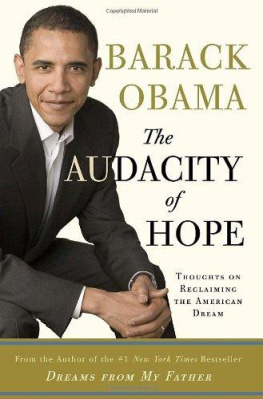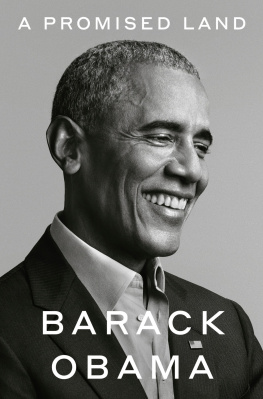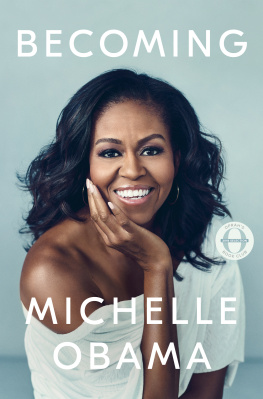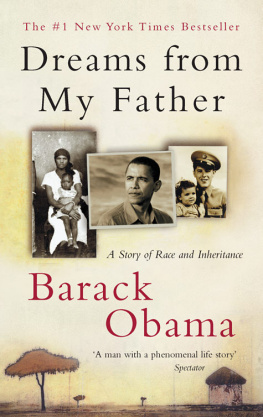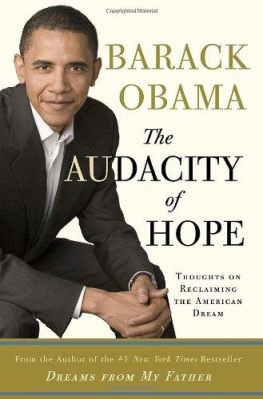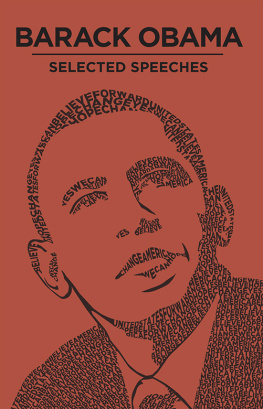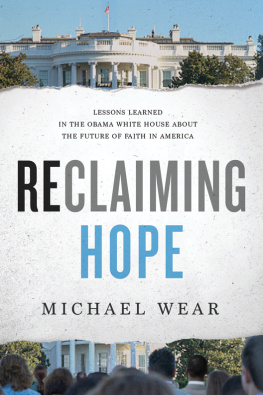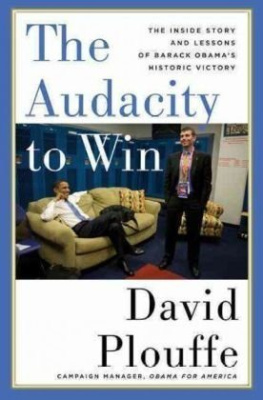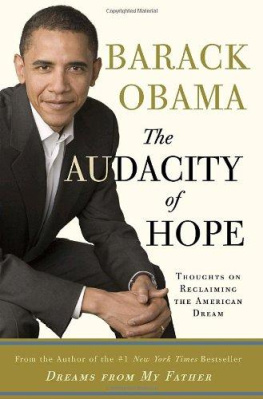The Audacity of Hope
Prologue
ITS BEEN ALMOST ten years since I first ran for political office. I was thirty-five at the time, four years out of law school, recently married, and generally impatient with life. A seat in the Illinois legislature had opened up, and several friends suggested that I run, thinking that my work as a civil rights lawyer, and contacts from my days as a community organizer, would make me a viable candidate. After discussing it with my wife, I entered the race and proceeded to do what every first-time candidate does: I talked to anyone who would listen. I went to block club meetings and church socials, beauty shops and barbershops. If two guys were standing on a corner, I would cross the street to hand them campaign literature. And everywhere I went, Id get some version of the same two questions.
Whered you get that funny name?
And then: You seem like a nice enough guy. Why do you want to go into something dirty and nasty like politics?
I was familiar with the question, a variant on the questions asked of me years earlier, when Id first arrived in Chicago to work in low-income neighborhoods. It signaled a cynicism not simply with politics but with the very notion of a public life, a cynicism thatat least in the South Side neighborhoods I sought to representhad been nourished by a generation of broken promises. In response, I would usually smile and nod and say that I understood the skepticism, but that there wasand always had beenanother tradition to politics, a tradition that stretched from the days of the countrys founding to the glory of the civil rights movement, a tradition based on the simple idea that we have a stake in one another, and that what binds us together is greater than what drives us apart, and that if enough people believe in the truth of that proposition and act on it, then we might not solve every problem, but we can get something meaningful done.
It was a pretty convincing speech, I thought. And although Im not sure that the people who heard me deliver it were similarly impressed, enough of them appreciated my earnestness and youthful swagger that I made it to the Illinois legislature.
SIX YEARS LATER, when I decided to run for the United States Senate, I wasnt so sure of myself.
By all appearances, my choice of careers seemed to have worked out. After two terms during which I labored in the minority, Democrats had gained control of the state senate, and I had subsequently passed a slew of bills, from reforms of the Illinois death penalty system to an expansion of the states health program for kids. I had continued to teach at the University of Chicago Law School, a job I enjoyed, and was frequently invited to speak around town. I had preserved my independence, my good name, and
my marriage, all of which, statistically speaking, had been placed at risk the moment I set foot in the state capital.
But the years had also taken their toll. Some of it was just a function of my getting older, I suppose, for if you are paying attention, each successive year will make you more intimately acquainted with all of your flawsthe blind spots, the recurring habits of thought that may be genetic or may be environmental, but that will almost certainly worsen with time, as surely as the hitch in your walk turns to pain in your hip. In me, one of those flaws had proven to be a chronic restlessness; an inability to appreciate, no matter how well things were going, those blessings that were right there in front of me. Its a flaw that is endemic to modern life, I thinkendemic, too, in the American characterand one that is nowhere more evident than in the field of politics. Whether politics actually encourages the trait or simply attracts those who possess it is unclear. Someone once said that every man is trying to either live up to his fathers expectations or make up for his fathers mistakes, and I suppose that may explain my particular malady as well as anything else.
In any event, it was as a consequence of that restlessness that I decided to challenge a sitting Democratic incumbent for his congressional seat in the 2000 election cycle. It was an ill-considered race, and I lost badlythe sort of drubbing that awakens you to the fact that life is not obliged to work out as youd planned. A year and a half later, the scars of that loss sufficiently healed, I had lunch with a media consultant who had been encouraging me for some time to run for statewide office. As it happened, the lunch was scheduled for late September 2001.
You realize, dont you, that the political dynamics have changed, he said as he picked at his salad.
What do you mean? I asked, knowing full well what he meant. We both looked down at the newspaper beside him. There, on the front page, was Osama bin Laden.
Hell of a thing, isnt it? he said, shaking his head. Really bad luck. You cant change your name, of course. Voters are suspicious of that kind of thing. Maybe if you were at the start of your career, you know, you could use a nickname or something. But now His voice trailed off and he shrugged apologetically before signaling the waiter to bring us the check.
I suspected he was right, and that realization ate away at me. For the first time in my career, I began to experience the envy of seeing younger politicians succeed where I had failed, moving into higher offices, getting more things done. The pleasures of politicsthe adrenaline of debate, the animal warmth of shaking hands and plunging into a crowdbegan to pale against the meaner tasks of the job: the begging for money, the long drives home after the banquet had run two hours longer than scheduled, the bad food and stale air and clipped phone conversations with a wife who had stuck by me so far but was pretty fed up with raising our children alone and was beginning to question my priorities. Even the legislative work, the policy making that had gotten me to run in the first place, began to feel too incremental, too removed from the larger battlesover taxes, security, health care, and jobsthat were being waged on a national stage. I began to harbor doubts about the path I had chosen; I began feeling the way I imagine an actor or athlete must feel when, after years of commitment to a particular dream,
after years of waiting tables between auditions or scratching out hits in the minor leagues, he realizes that hes gone just about as far as talent or fortune will take him. The dream will not happen, and he now faces the choice of accepting this fact like a grownup and moving on to more sensible pursuits, or refusing the truth and ending up bitter, quarrelsome, and slightly pathetic.
DENIAL, ANGER, bargaining, despairIm not sure I went through all the stages prescribed by the experts. At some point, though, I arrived at acceptanceof my limits, and, in a way, my mortality. I refocused on my work in the state senate and took satisfaction from the reforms and initiatives that my position afforded. I spent more time at home, and watched my daughters grow, and properly cherished my wife, and thought about my long-term financial obligations. I exercised, and read novels, and came to appreciate how the earth rotated around the sun and the seasons came and went without any particular exertions on my part.
And it was this acceptance, I think, that allowed me to come up with the thoroughly cockeyed idea of running for the United States Senate. An up-or-out strategy was how I described it to my wife, one last shot to test out my ideas before I settled into a calmer, more stable, and better-paying existence. And sheperhaps more out of pity than convictionagreed to this one last race, though she also suggested that given the orderly life she preferred for our family, I shouldnt necessarily count on her vote.
I let her take comfort in the long odds against me. The Republican incumbent, Peter Fitzgerald, had spent $19 million of his personal wealth to unseat the previous senator, Carol Moseley Braun. He wasnt widely popular; in fact he didnt really seem to enjoy politics all that much. But he still had unlimited money in his family, as well as a genuine integrity that had earned him grudging respect from the voters.

